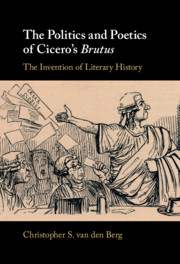Book contents
- The Politics and Poetics of Cicero’s Brutus
- The Politics and Poetics of Cicero’s Brutus
- Copyright page
- Dedication
- Contents
- Preface and Acknowledgments
- A Note on the Text
- Abbreviations
- Introduction
- Chapter 1 Ciceropaideia
- Chapter 2 The Intellectual Genealogy of the Brutus
- Chapter 3 Caesar and the Political Crisis
- Chapter 4 Truthmaking and the Past
- Chapter 5 Beginning (and) Literary History
- Chapter 6 Perfecting Literary History
- Chapter 7 Cicero’s Attici
- Chapter 8 Minerva, Venus, and Cicero’s Judgments on Caesar’s Style
- Conclusion
- References
- General Index
- Index Locorum
Chapter 7 - Cicero’s Attici
- The Politics and Poetics of Cicero’s Brutus
- The Politics and Poetics of Cicero’s Brutus
- Copyright page
- Dedication
- Contents
- Preface and Acknowledgments
- A Note on the Text
- Abbreviations
- Introduction
- Chapter 1 Ciceropaideia
- Chapter 2 The Intellectual Genealogy of the Brutus
- Chapter 3 Caesar and the Political Crisis
- Chapter 4 Truthmaking and the Past
- Chapter 5 Beginning (and) Literary History
- Chapter 6 Perfecting Literary History
- Chapter 7 Cicero’s Attici
- Chapter 8 Minerva, Venus, and Cicero’s Judgments on Caesar’s Style
- Conclusion
- References
- General Index
- Index Locorum
Summary
Chapter 7 considers stylistic imitation and appropriation in the debate over Atticism and Asianism, with a special focus on how Cicero distorts the aims and positions of his detractors in the diatribe against the Atticists (285–91). He trades on various meanings of Atticus/Attici in order to make a rhetorical – rather than strictly logical – case. He downplays Atticism as outdated and relegates its stylistic virtues to the plain style (genus tenue). Rejecting Atticism does not entail rejecting the plain style. Instead he acknowledges it as one of many oratorical virtues to be subsumed under the capable orator’s broad stylistic repertoire. Cicero promotes a model of stylistic diversity, examples of which are found in the long histories of Greek and, especially, Roman oratory.
Keywords
- Type
- Chapter
- Information
- The Politics and Poetics of Cicero's BrutusThe Invention of Literary History, pp. 191 - 216Publisher: Cambridge University PressPrint publication year: 2021

